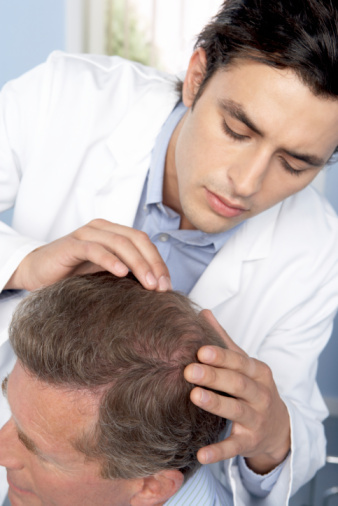 If your scalp is irritated, if it itches, if it is inflamed, or if you feel burning sensations on the top of your head, you may be suffering from a common but treatable condition known as scalp folliculitis. In addition to these annoying and sometimes painful symptoms, scalp folliculitis can also cause hair loss. With a proper diagnosis by a trained and experienced hair loss professional who can identify the specific source of the problem, folliculitis can be remedied, as can any resulting hair loss.
If your scalp is irritated, if it itches, if it is inflamed, or if you feel burning sensations on the top of your head, you may be suffering from a common but treatable condition known as scalp folliculitis. In addition to these annoying and sometimes painful symptoms, scalp folliculitis can also cause hair loss. With a proper diagnosis by a trained and experienced hair loss professional who can identify the specific source of the problem, folliculitis can be remedied, as can any resulting hair loss.
Symptoms and Causes of Folliculitis
The most impactful aspect of scalp folliculitis, and the one most responsible for hair loss, is the moderate to severe irritation of the hair follicles. This irritation, in addition to being uncomfortable, may disrupt normal hair growth when left untreated, causing follicles to weaken, die, and eventually fall out.
The most common symptoms of folliculitis include pimples, itchiness, burning sensations, or discharge along the hairline, crown of the head, or rear/sides of the scalp. Don’t make the situation any worse by scratching, which will only add to the discomfort and do nothing to solve the problem.
There is no one single cause of hair folliculitis; it can be the result of many different factors, including:
- Yeast
- Fungus
- Bacteria
- Psoriasis
- Damaged hair follicles
- Blockage caused by irritants like sweat, oils, and cosmetic makeup
Treatment for Hair Folliculitis and Accompanying Hair Loss
The key to effectively treating scalp folliculitis is correctly identifying the cause. An antibiotic ointment may be effective for defeating an infection-based case of folliculitis but won’t do you much good if your condition was the result of psoriasis, for example.
Once your physician or hair loss professional evaluates your condition and determines the nature of your folliculitis, he or she will recommend the optimal treatment. Folliculitis caused by infection can be treated with over the counter antibiotic oral medication, ointments and washes such as benzoyl peroxide (Clearasil, Proactiv), chlorhexidine (Hibiclens), or Phisoderm. If fungus is the source of your folliculitis, antifungal shampoos such as Nizoral A‑D, available over-the-counter, will reduce and eliminate the source of your condition when used regularly. Similarly, non-infectious hair folliculitis can be treated by thoroughly cleaning excess sebum from the scalp with a prescription shampoo.
In conjunction with addressing the underlying folliculitis, you and your hair loss doctor can also take steps to address and remedy any hair loss you may have experienced as a result of the condition. This could include such treatments as:
- Topical hair loss foams such as Rogaine®.
- Prescription hair loss medication such as finasteride, better known as Propecia® (available only for men).
- Laser hair restoration, a minimally invasive, nonsurgical hair restoration option that involves laser treatment up to 3-4 times weekly. Patients may visit our office to receive laser therapy, or they may purchase a personal-use hair restoration laser like the Capillus272™ Profor use at home.
Call Miami Hair Today to Schedule a Folliculitis Consultation
If you notice any of the symptoms of hair folliculitis, are experiencing irritation and discomfort of your scalp, or are losing hair, schedule a hair loss evaluation at the Hair Institute of Miami today. Our world-renowned experts will identify the nature of the problem and formulate an effective and personally tailored treatment plan. To learn more about treatment, contact our clinic at 305-925-0222.

